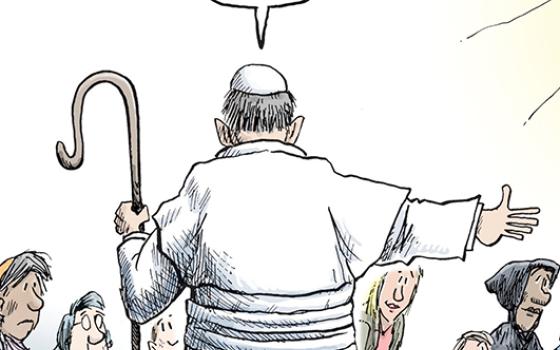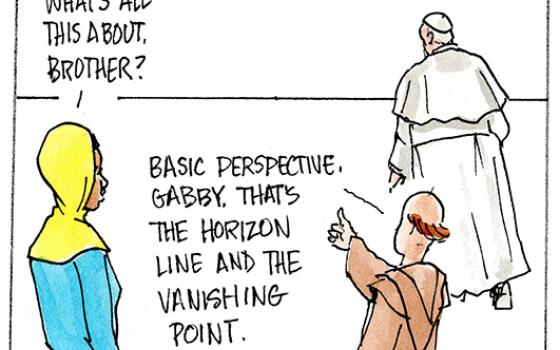Pope Francis is seen in a video message released Aug. 30, 2024, discussing his prayer intention for the month of September, which focused on care for the environment and for the poor. Francis, who died April 21 at age 88, had made ecological concerns a cornerstone of his papacy. (CNS screengrab/Pope's Worldwide Prayer Network)
From his first moments as the global leader of the Roman Catholic Church, Pope Francis swiftly emerged as the world's moral conscience on climate change and other environmental crises threatening the planet.
Francis, who died at age 88 at the Vatican on April 21, Easter Monday, made ecological concern a cornerstone of his 12-year papacy and positioned care of creation as both a nonnegotiable pillar of the Christian faith and "essential to a life of virtue."
That emphasis began with his name.
Francis was the first pope to select as his namesake St. Francis of Assisi, the 13th-century friar whose many titles include patron saint of ecology. In March 2013, three days after his election inside the Sistine Chapel, the new pope explained the choice: "For me, he is the man of poverty, the man of peace, the man who loves and protects creation; these days we do not have a very good relationship with creation, do we?"
More ecological firsts would follow.
From the countless topics he could have chosen for his first encyclical, Francis chose the environment. In spring 2015, he issued "Laudato Si', on Care for Our Common Home," an expansive treatise on humanity's role within creation at a time of mounting environmental threats. Its title drew from a passage in Francis of Assisi's "Canticle of Creatures."
With Laudato Si', Pope Francis compiled the compendium of Catholic thought and teachings on socio-ecological matters and provided the church, and the world, a moral and ethical lens for climate change, biodiversity loss, pollution and other environmental challenges facing the planet and its people.
"The urgent challenge to protect our common home," Francis wrote, "includes a concern to bring the whole human family together to seek a sustainable and integral development, for we know that things can change."
A student shows Pope Francis a lesson on the environment during his visit to Our Lady Queen of Angels School in the East Harlem area of New York Sept. 25, 2015. Francis, who died April 21 at age 88, earlier that year had issued " 'Laudato Si',' on Care for Our Common Home," which addressed humanity's role within creation at a time of mounting environmental threats. (CNS)
The encyclical — one of the highest forms of papal teaching documents — elevated the idea of integral ecology ("everything is connected") and gave new voice to liberation theologian Fr. Leonardo Boff's plea to "hear both the cry of the earth and the cry of the poor." It recognized that justice for the natural world and animal species is inseparable from justice for marginalized human communities.
Francis blasted "throwaway culture" and criticized wealthy nations for the "ecological debt" they have incurred from exploiting resources in the Global South. And he placed the church firmly on the side of science on climate change, writing that "most global warming in recent decades is due to the great concentration of greenhouse gases (carbon dioxide, methane, nitrogen oxides and others) released mainly as a result of human activity."
With Laudato Si', Francis sought to spur a stronger global response on environmental issues, including climate change. For the past decade, his words have permeated international environmental diplomacy and animated large swaths of the Catholic Church on ecological issues for the past decade.
Pope Francis greets Swedish climate activist Greta Thunberg during his general audience in St. Peter's Square at the Vatican in this file photo from April 17, 2019. (CNS/Vatican Media)
Laudato Si' inspired new movements and commitments, including through the Laudato Si' Action Platform that Francis established. It renewed support for efforts already underway on behalf of ecosystems and the planet, particularly in religious congregations. Francis' declaration that coal, oil and gas — the primary drivers of climate change — must "be progressively replaced without delay" motivated Catholic institutions to consider renewable energy and financial divestment from fossil fuels.
Beyond the Catholic Church, Laudato Si' positioned Francis as a global leader on climate change and ecological issues. Scientists praised his understanding of climate change. U.N. diplomats cited him in speeches and during the negotiations that led to the 2015 Paris Agreement. Laudato Si' proved a rallying point for a united faith front on climate change and environmental calamities, and even sparked a sister document from Muslim scholars.
"Pope Francis has left a profound legacy on environmental issues," said Christiana Figueres, former United Nations climate chief who was the lead architect of the Paris Agreement.
"He emphasized the moral responsibility to care for the Earth, framing climate change not just as an environmental crisis, but as a social and ethical one. … By highlighting the interconnectedness of humanity and the planet, Francis' teachings have inspired both religious and secular communities to confront the ecological challenges of our time with compassion, urgency, and responsibility," she said.
"A very, very sad day for us all. For the world. The world has lost a true leader," said Lorna Gold, executive director of the Laudato Si' Movement. The global network of 900-plus Catholic organizations in more than 140 countries works to live out Francis' calls in his landmark encyclical.
Pope Francis greets Lorna Gold, executive director of the Laudato Si' Movement, during a private audience at the Vatican Jan. 30, 2025. (OSV News/Vatican Media via CPP)
The U.S.-based Catholic Climate Covenant said in a statement that "Environmental groups and many others around the world found the encyclical to be the most influential statement ever written on our ongoing crisis. We would not argue otherwise."
Bill McKibben, climate activist and founder of grassroots climate group 350.org founder, in his newsletter April 21 called Laudato Si' "the most important document of his papacy and arguably the most important piece of writing so far this millennium." He described Franics as "perhaps the world's greatest environmental champion," one who brought "moral resolve to the question of climate change."
In addition to his words, Francis invoked actions on behalf of creation.
He placed on the liturgical calendar a World Day of Prayer for the Care of Creation (Sept. 1) and invited Catholics to mark the ensuing monthlong Season of Creation along fellow Christians. He added "care for creation" to the works of mercy. He directed the concept of "ecological sin" be added to the Catechism of the Catholic Church.
Under his watch, the Vatican officially joined the Paris Agreement in 2022 and committed the Vatican City State to become carbon neutral by 2050. The Laudato Si' Action Platform invited Catholic institutions worldwide to commit to similar goals. He met with world leaders and oil executives alike, urging all to move swiftly to slash heat-trapping emissions.
As the first pope from Latin America, Francis' papacy for the margins also extended to frontline communities. He placed the church in solidarity with Indigenous communities facing threats from mining and extractions. He criticized the pillaging of natural resources in the Global South by wealthy nations and corporations.
'There are no lasting changes without cultural changes, without a maturing of lifestyles and convictions within societies, and there are no cultural changes without personal changes.'
—Pope Francis
His travels took him to a typhoon-ravaged city in the Philippines and into the Amazon rainforest and Congo Basin — the two lungs of the planet. During a 2018 visit to the Peruvian Amazon, he told Indigenous people there that the land where they stood was "holy ground." A year later, he hosted a special Synod on the Amazon devoted to the environmental and pastoral plights facing Catholics in the vast South American biome. He later called its plundering an "injustice and crime" in his apostolic exhortation Querida Amazonia.
"We must say it. He has supported us in our fight," Patricia Gualinga, a Kichwa leader in Amazonian Ecuador and the first Indigenous representative to the Ecclesial Conference of the Amazon, said in 2023.
Eight years after issuing Laudato Si', Francis released the apostolic exhortation Laudate Deum, where he bemoaned the lack of progress "on the climate crisis."
"I have realized that our responses have not been adequate, while the world in which we live is collapsing and may be nearing the breaking point," he wrote. "In addition to this possibility, it is indubitable that the impact of climate change will increasingly prejudice the lives and families of many persons."
The need to reduce global temperatures is paramount to alleviate human suffering, Francis wrote.
"Yet what is important," he said, "is something less quantitative: the need to realize that there are no lasting changes without cultural changes, without a maturing of lifestyles and convictions within societies, and there are no cultural changes without personal changes."
Advertisement
Gold said that Francis' contributions to the church and the world "through Laudato Si' and Laudate Deum will remain as a legacy of his papacy for many, many decades to come."
"We are heartbroken," she said, "but we take on this responsibility to be a living legacy of Pope Francis and to carry his message forward, in particular his courage to speak truth to power — and he lived this right to the very end in his service of the mission of the church."
Despite his often frank assessments, Francis routinely urged the world community not to lose hope in the face of complex and massive challenges.
In a March meeting with Brazilian bishops for the 2025 Jubilee Year, he said that in issuing Laudato Si' and Laudate Deum, "I wanted to draw the attention of all humanity to the urgency of a necessary change of attitude in our relations with the environment, recalling that the current 'ecological crisis is also a summons to profound interior conversion.' "
"May we all, with the special help of God’s grace in this Jubilee season, change our convictions and practices to let nature rest from our rapacious exploitations."







